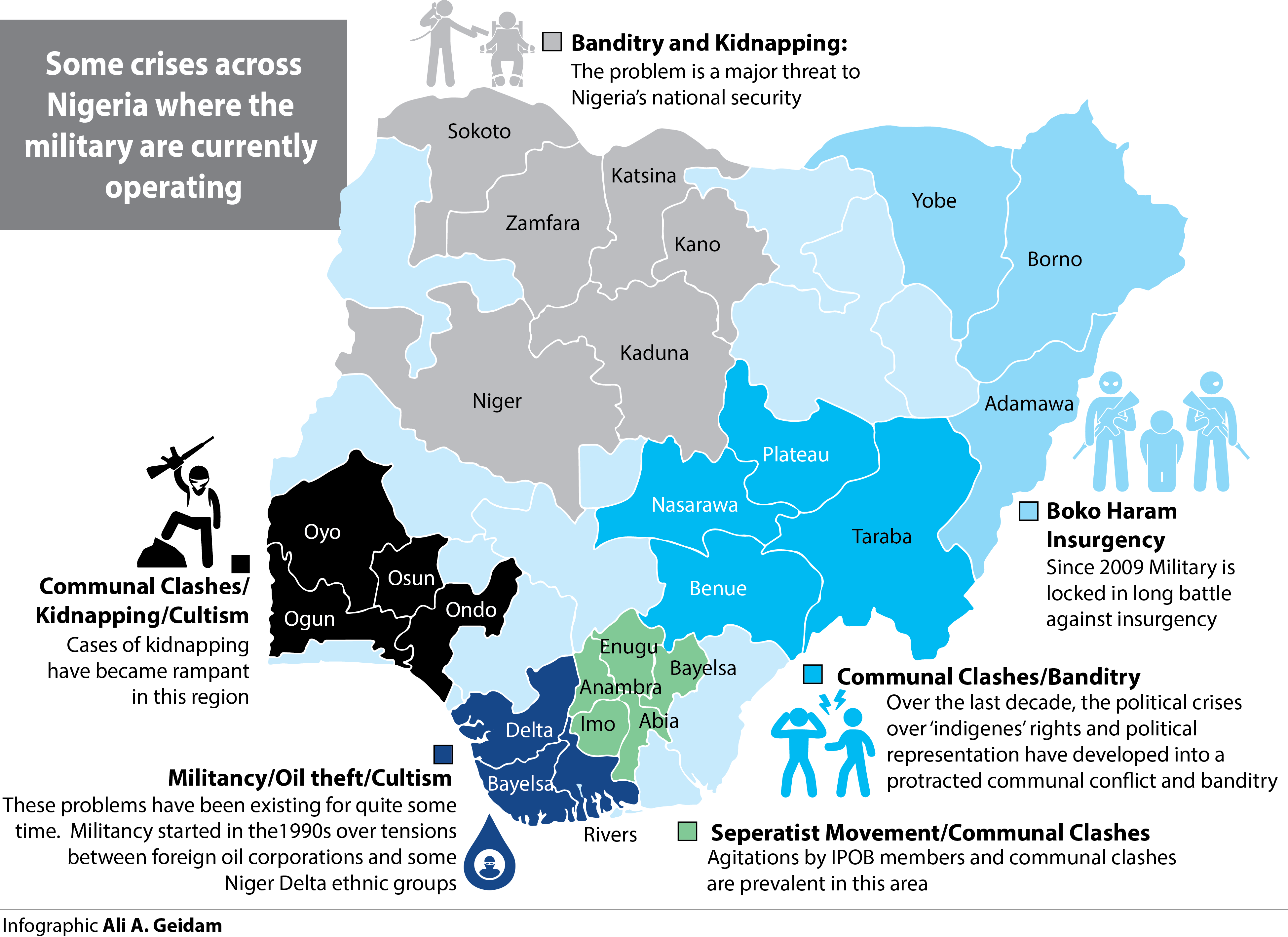The new service chiefs appointed by President Muhammadu Buhari on Tuesday, are in for a tough, rough ride to secure a country bedevilled by a mishmash of internal security challenges– long-drawn insurgency, raging banditry, secessionist threats and rising cases of kidnap for ransom.
The presidency pulled a surprise Tuesday afternoon when it suddenly announced the “resignation” of the four service chiefs.
- Meet the new service chiefs: who are they, what have they done?
- Hoodlums Kill Policeman In Aba, Cart Away AK-47 Rifle
Citing many reasons, experts said the service chiefs couldn’t have resigned, insisting the president must have asked them to go.
President Buhari had, for a long time, ignored calls by citizens and key stakeholders, including the National Assembly, to sack the service chiefs.
The top military officers affected by the change were the Chief of Defence Staff, Abayomi Gabriel Olanisakin; Chief of Army Staff, Lt. General Tukur Buratai; Chief of Naval Staff, Vice Admiral Ibok Ekwe Ibas and the Chief of Air Staff, Air Marshal Sadique Abubakar.
The outgoing service chiefs were appointed by President Buhari in July 2015, serving for five years and six months before their reported resignation on Tuesday.
In their place, presidential spokesperson Femi Adesina announced that the president appointed Major General Leo Irabor as the Chief of Defence Staff, Major General Ibrahim Attahiru as the Chief of Army Staff, Rear Admiral A.Z Gambo as the Chief of Naval Staff, and Air Vice Marshal I.O Amao as the new Chief of Air Staff.
High stakes
The new service chiefs will be stepping into the pinching shoes of their predecessors, characterised by endless security problems, which the foursome was unable to fully resolve.
Though internal security is primarily the duty of the police, the military has almost completely taken over that function from the police since it was called in to help quell the Boko Haram uprising, which went out of control of the police.
For over 10 years, the military is drawn out to respond to all manner of security breaches and enforce law and order, straining its capacity in the process.
While the military had recorded some successes in the fight against Boko Haram insurgency in the North-east, the top brass appeared helpless as the country was engulfed in fresh security threats from different fronts.
Hopes and expectations are high on the new service chiefs to confront the old and new challenges afflicting the country head on.
The Boko Haram insurgency, which flared up in 2009, is far from over, 12 years on. The insurgents still stage daring attacks and working hard to cut off Borno State from its neighbouring Yobe, through incessant gruesome highway attacks. This is in spite of repeated claims by the military high commands that the extremists have been decimated, or “technically defeated”.
Vast land in northern Borno linking up to the strategic Lake Chad area is still inhabitable for civilians. Penultimate Friday, Boko Haram fighters nearly took over the important town of Marte, engaging the sentry soldiers in a gunfight for over 20 hours.
On Friday, after a meeting with the president at the Aso Villa in Abuja, Nasarawa State governor, Abdullahi Sule, cried that members of a Boko Haram splinter group were regrouping along the border between his state and neighbouring Benue, from where they launch attacks.
Veterans of war against Boko Haram
Interestingly, both the new chief of defence staff and the new chief of army staff are veterans of the Boko Haram war. Attahiru took over from Irabor as Theatre Commander of the Maiduguri-based Operation Lafiya Dole, in May 2017.
Next to Boko Haram, in the long list of Nigeria’s many security challenges is the ravaging rural banditry, which has sacked thousands of village dwellers and rendered thousand others poorer due to activities of marauding gunmen in the North West and North Central regions.
IPOB, farmers/herders conflicts
The undying agitation of members of the Indigenous Peoples of Biafra (IPOB) is a huge hurdle before service chiefs as they move into the new roles. Over the weekend, soldiers and policemen clashed with members of IPOB’s Eastern Security Network (ESN) leaving in its wake deaths and devastation.
Piracy in the coastal zones of the country still goes on, alongside illegal oil bunkering, though much subdued. Only three days ago, a Turkish ship from Nigeria was attacked on its way to Gabon.
Latest agitation to the country’s cocktail of conflicts is the shifting of the perennial farmer/herder conflict and kidnapping to the South-western part of the country, leading to high tensions last week following an attack on a Fulani community in Oyo, days after Ondo State Governor, Rotimi Akeredolu, gave herders seven days to leave some forests in his state.
The human rights record of the Nigerian military in the last six years is a blemish the quartet of the service chiefs would have to clean up.
The alleged killings of civilians in the North-East war theatre, December 2015 mass killings of members of the Shiite Islamic Movement in Nigeria (IMN) in Zaria, and the May 2016 shooting of members of IPOB in Onitsha, are only prominent of the odious records.
Added to these were unwarranted raids carried out on the media.
Experts believe that the new helmsmen may not be messiahs with magic wands, but Nigerians expect more than the usual from them in addressing the myriads of insecurity issues across the country.

 Join Daily Trust WhatsApp Community For Quick Access To News and Happenings Around You.
Join Daily Trust WhatsApp Community For Quick Access To News and Happenings Around You.


